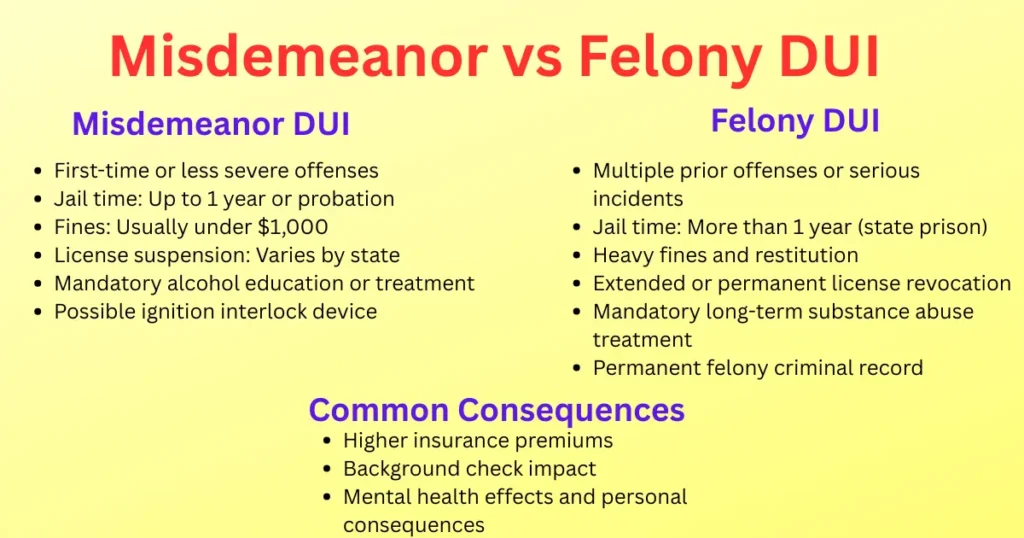Last updated on February 7th, 2026 at 06:46 am
Driving under the influence (DUI) is a serious legal offense that can impact various aspects of your life, from your personal relationships to your career and mental health. A common question many people ask is: Is a DUI a felony or a misdemeanor? The answer can vary depending on several factors, including the state where the offense occurred and the circumstances surrounding the incident.
In this article, we will break down DUI charges in simple terms, explain the difference between misdemeanor and felony DUIs, and explore the long-term consequences.

What is a DUI?
DUI stands for Driving Under the Influence. It means operating a vehicle while impaired by alcohol, drugs, or any intoxicating substance. Some states also refer to it as DWI (Driving While Intoxicated). The core issue is that your ability to drive safely is compromised, increasing the risk of accidents and injuries.
According to the National Highway Traffic Safety Administration (NHTSA), 34 people die every day in drunk-driving crashes in the U.S.—that’s one person every 42 minutes. In 2023 alone, 12,429 people died in alcohol-impaired traffic deaths. These deaths were all preventable.
Is a DUI a Felony or a Misdemeanor?
Usually a Misdemeanor for the First Offense
In most states, a first-time DUI offense is classified as a misdemeanor. This means it is considered a less serious crime and usually results in penalties like fines, license suspension, mandatory alcohol education programs, and possibly some jail time, often less than a year.
When Does a DUI Become a Felony?
A DUI can become a felony under specific conditions, such as:
- Multiple Prior DUI Convictions: If you have had multiple DUI charges before, your new DUI could be elevated to a felony charge.
- Serious Injury or Death: If your impaired driving results in someone being seriously injured or killed, it can lead to felony charges.
- Child Endangerment: Driving under the influence with a child in the car is considered child endangerment and can lead to felony charges.
- Refusing a Breath Test: If you refuse to take a breath or blood test and have prior offenses, it could be classified as a felony.

DUI Laws Vary by State
DUI laws differ significantly across the United States. What counts as a felony DUI in one state may only be a misdemeanor in another. Here are some examples:
- New Jersey: A DUI is treated as a serious traffic violation and is not classified as a misdemeanor or felony for first and second offenses. However, a third DUI or one causing injury can be a felony.
- Tennessee: A DUI conviction stays on your record permanently. A first DUI is typically a misdemeanor, while a third or subsequent offense can be classified as a felony.
- New York & Wisconsin: These states may treat first-time DUIs differently compared to others.
Always consult local laws or a qualified DUI attorney to understand how your state handles DUI charges.
Key DUI Consequences
Misdemeanor DUI Penalties
For a misdemeanor DUI, you might face:
- Jail time up to 1 year or probation
- Fines typically under $1,000
- License suspension (the duration varies by state)
- Mandatory alcohol education or treatment programs
- Possible installation of an ignition interlock device
Felony DUI Penalties
For a felony DUI, the penalties can be severe:
- Prison sentences often exceeding 1 year, typically served in a state prison
- Heavy fines and restitution payments
- Extended or permanent license revocation
- Long-term or mandatory substance abuse treatment
- A permanent felony criminal record
Additional Consequences
- License Suspensions: Your driving privileges can be suspended immediately and for a lengthy period.
- Ignition Interlock Devices: These devices prevent a vehicle from starting if alcohol is detected.
- Insurance Implications: A DUI can lead to significantly higher auto insurance premiums or even loss of coverage. Some offenders may be placed in a high-risk insurance pool.
- Background Checks: DUI convictions, especially felonies, can appear on background checks and affect job and housing opportunities.
Mental Health and Personal Impact
A DUI conviction can have a profound effect on your mental and emotional well-being:
- Feelings of shame, guilt, anxiety, and depression are common.
- Stress related to court proceedings, financial penalties, and potential job loss can be overwhelming.
- Personal relationships may suffer due to the emotional toll of the situation.
- Some individuals may struggle with alcohol addiction following a DUI incident.
If you are feeling overwhelmed, it’s important to seek support. Consider reaching out to:
- Counselors or therapists: They can help you cope with the emotional aftermath.
- DUI Education Programs: These provide valuable resources.
- Support Groups: Groups like Alcoholics Anonymous (AA) for community and encouragement.
Struggling with alcohol misuse after a DUI? Be aware of the hidden signs of alcohol (ETOH) abuse and take steps toward recovery before it spirals further.
How Long Does a DUI Stay on Your Record?
The duration a DUI stays on your record varies by state:
- In Tennessee, a DUI remains on your driving record for 55 years and can stay on your criminal record permanently.
- In some states, DUIs may be eligible for expungement after a certain period, while others keep DUI convictions indefinitely on your record.
What Should You Do if Facing DUI Charges?
If you find yourself facing DUI charges, consider the following steps:
- Consult a DUI Lawyer: They can explain the charges, possible penalties, and legal strategies tailored to your situation.
- Understand Your Rights: Know whether your DUI is classified as a misdemeanor or felony and what that means for you.
- Seek Help: If alcohol use is a problem, consider seeking treatment early on.
- Comply with Court Orders: Adhere to any license suspensions, education programs, or other penalties imposed by the court.
Conclusion: Take DUI Charges Seriously
Whether classified as a misdemeanor or a felony, a DUI is a serious offense with far-reaching consequences. Understanding Is a DUI a Felony? is essential for making informed decisions. Always avoid driving under the influence, and if you find yourself charged, seek immediate legal counsel.
By understanding the implications of a DUI, you can take steps to protect your future and your mental health. Your mistakes do not define you, how you choose to learn and grow from them does.

